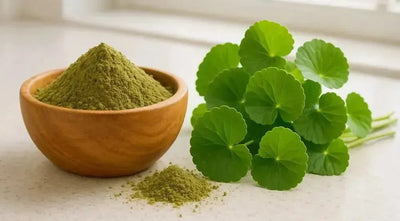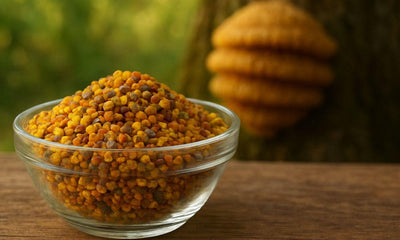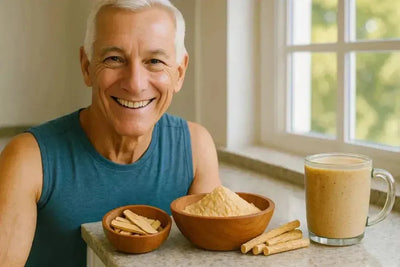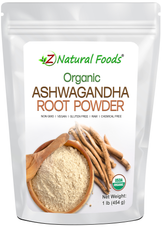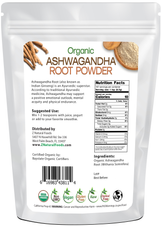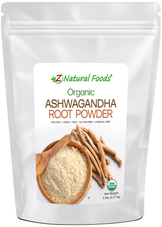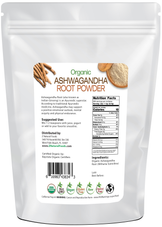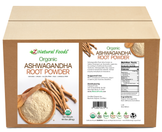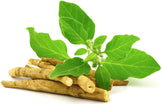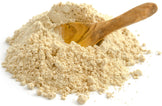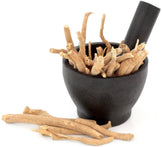Description
Description
Not long ago I wrote an article about all the wonderful benefits of the great Ayurvedic Adaptogen Ashwagandha.
This amazing herb has been an Ayurvedic staple -- in the oldest system of medicine known to man -- it’s also supported by quality Eastern and Western research.
Ashwagandha has been proven in human studies to be extremely safe and very effective for both short and long-term use when supporting a healthy stress response.
Can Ashwagandha benefit you?
In general terms, this traditional Ayurvedic herb has stood the test of time and has been used in a safe and effective manner for just about anyone who deals with the stressors of daily life. The correct question is not whether you should use it but…
When is it right for you to take Ashwagandha?
Based on the research, when you look at the 5 studies below, it is clear that ashwagandha offers profound effects in supporting healthy stress and cortisol levels. Cortisol is a steroid hormone released by the adrenal glands which help control blood sugar, regulate metabolism, blood pressure, and healthy inflammation levels. When it is out of control, it can throw all of these systems out of whack. Unfortunately, anyone who lives in our fast-paced, modern society knows stress, anxiety, and panic. Therefore, many people could clearly benefit simply based on the evidence presented below:
- Ashwagandha, stress, and anxiety: in this study, the test group reduces stress! An even more impressive result was the reduced in cortisol -- the stress hormone. (1).
- Ashwagandha, stress, and weight: Again, “Ashwagandha reduced cortisol levels” and reduced emotional eating. These results suggest that for those who have trouble maintaining a healthy body weight due to the effects of “chronic stress”, Ashwagandha has very supportive qualities. (2)
- Ashwagandha and memory: Ashwagandha showed after 8 weeks of use “significant improvement in both immediate and general memory”(3).
- Ashwagandha, muscle strength and recovery: Ashwagandha showed “significantly greater improvement” in both the bench press and leg press and also had a “greater reduction in exercise-induced muscle damage”. (4)
- Ashwagandha and bipolar patients: This study showed improved auditory-verbal working memory and improved social cognition in those with bipolar disorder. (5)
Traditional uses of Ashwagandha
Traditionally, Ashwagandha is known as a “restorative” adaptogen simply based on its effects to support the body in recovery from both physical and mental trauma.
In an overview of the research on ashwagandha, the following was stated about its effects on the neurochemical GABA. Note, low Gaba levels are what is most associated with anxiety and panic.
“The beneficial effect of Ashwagandha root extract might be due to its GABA mimetic activity. Ashwagandha, its constituents and the metabolites of its constituents promote the growth of nerves after taking it for 7 days”. (6)
Based on traditional ayurvedic practices, ashwagandha results are best attained when used in these two ways:
- Post detoxification program. This is when the body is considered to be in a more clean and pure state. Ashwagandha is not traditionally used to “reverse” any specific conditions, but instead, to support the body in optimizing both the healing process (once the condition has been resolved) and the restoration process.
- Right as you are about to begin your 8 hours of sleep and recovery. Optimal recovery happens when the body is at rest. This is a perfect time to use ashwagandha to support all aspects of restoration. To be clear, this is not a sleep aid.
Does this mean you can’t use it in times of crisis?
No, of course not. Regardless of when you use it, this wonderful herb will support your body in “getting the job done”. As a matter of fact, I would consider our most stressful moments to be a time of crisis (based on how you personally handle stress). I am simply trying to show you how to get the most bang for your buck.
Will Ashwagandha affect my personality?
After almost 18 years working as a Master Herbalist, I have found that (especially with adaptogens) one's personality does play a role in which adaptogens will work best. In the case of Ashwagandha, while almost anyone will see a positive benefit, those with very aggressive personalities who need help to “bring it down a notch” seem to respond very well as the effects are seen fairly quickly.
This is one of the reasons I consider ashwagandha to be an important gateway herb. This is also a major reason why it is the only “true” adaptogen you can take before you go to sleep. Here is an important fact to keep in mind:
Regardless of our individual personalities, we ALL have moments of feeling “out of control” and this is where Ashwagandha can be a godsend for both short-term and long-term use.
How to get the most from your Ashwagandha
While I don’t expect your program to be as specifically fine-tuned as mine, I will show you what I do so you can use it as a guide.
I should mention, I base my targeted approach on a saliva adrenal/cortisol test I took.
This test required me to produce 4 samples of saliva at specific times of the day and evening in order to see what my cortisol levels look like. I will not give you my specific test results but here is how I use ashwagandha based on what the test showed.
In simple terms, my cortisol levels are too low in the morning (when they should be higher) and too high in the mid-afternoon (when they should be low).
So, in the morning I use more energizing adaptogens like Rhodiola and American ginseng. I use my first dose of ashwagandha (2 grams) between 2-3pm combined with holy basil (500 mg), Cordyceps (1000 mg) and bacopa (300 mg). At that same time, I also use 30 mg CBD oil, 500 mg of theanine and 1000 mg taurine to support my GABA levels.
My final dose of ashwagandha is about 1 hour before bed at a dosage of 2g combined with 200 mg of phosphatidylserine and 400 mg of magnesium glycinate.
There are many wonderful ways to use Ashwagandha to gain its benefits. To get the most bang for your buck I would suggest you use it based on your personality and individual needs. This is best achieved by taking it at specific times (times of highest stress levels) and combining it with other herbs and foods to support its effects.
About Michael Stuchiner
 Michael Stuchiner is an experienced Master Herbalist, the Head of Education for Z Natural Foods, a teacher, and an accomplished author. With an 18-year specialization in medicinal herbs, Mike also has a vast knowledge in tonic and adaptogenic herbalism. Mike has enjoyed a 25-year career as an elite-level competitive powerlifter where he learned to heal his ‘mind and body’ as an avid user of herbal remedies.
Michael Stuchiner is an experienced Master Herbalist, the Head of Education for Z Natural Foods, a teacher, and an accomplished author. With an 18-year specialization in medicinal herbs, Mike also has a vast knowledge in tonic and adaptogenic herbalism. Mike has enjoyed a 25-year career as an elite-level competitive powerlifter where he learned to heal his ‘mind and body’ as an avid user of herbal remedies.
As an “in-the-trenches” herbalist, Mike has done more than 85 speaking engagements, consulted with clients ranging from young to elderly, worked with athletes in virtually all sports and with clients who have “dis-ease” states of a wide variety. Mike also mentors student Master Herbalists and will continue to teach the next generation to grow a deeper wisdom of the human body through appropriate herbal remedies.
For Bulk inquiries and custom formulations click here: https://www.znaturalfoods.com/pages/bulk
References
- A prospective, randomized double-blind, placebo-controlled study of safety and efficacy of a high-concentration full-spectrum extract of Ashwagandha root in reducing stress and anxiety in adults. Chandrasekhar, K., Kapoor, J., & Anishetty, S. (2012). Indian journal of psychological medicine, 34(3), 255.
- Body Weight Management in Adults Under Chronic Stress Through Treatment With Ashwagandha Root Extract: A Double-Blind, Randomized, Placebo-Controlled Trial. Choudhary, D., Bhattacharyya, S., & Joshi, K. (2017). Journal of
evidence based complementary & alternative based medicine, 22(1), 96-106. - Efficacy and Safety of Ashwagandha (Withania
somnifera (L.) Dunal) Root Extract in Improving Memory and Cognitive Functions Choudhary, D., Bhattacharyya, S., & Bose, S. (2017). Journal of Dietary Supplements, 1-14. Chicago - Examining the effect of Withania
somnifera supplementation on muscle strength and recovery: a randomized controlled trial Wankhede, S., Langade, D., Joshi, K., Sinha, S. R., & Bhattacharyya, S. (2015). Journal of the International Society of Sports Nutrition, 12(1), 43. - Randomized placebo-controlled adjunctive study of an extract of
withania somnifera for cognitive dysfunction in bipolar disorder. Chengappa KN1, Bowie CR, Schlicht PJ, Fleet D, Brar JS, Jindal R. (2013). Journal of Clinical Psychiatry, 74(11). https://www.ncbi.nlm.nih.gov/pubmed/24330893 - An Overview on Ashwagandha: A Rasayana (Rejuvenator) of Ayurveda. Narendra Singh, Mohit Bhalla, Prashanti de Jager,* and Marilena Gilca** (2011) Afr J Tradit Complement Altern Med. 2011; 8(5 Suppl): 208–213. https://www.ncbi.nlm.nih.gov/pmc/articles/PMC3252722/
